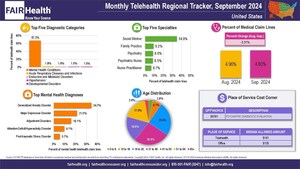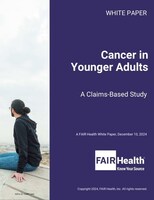FAIR Health Launches Actionable Tools with Healthcare Cost Information for Older Adults and Family Caregivers
Tools Further Shared Decision Making and Healthcare Engagement for Older Patients
Initiative Supported by Grant from The John A. Hartford Foundation
NEW YORK, Sept. 14, 2022 /PRNewswire/ -- As part of an initiative funded by The John A. Hartford Foundation, FAIR Health, a national, independent nonprofit, today launched five new shared decision-making tools, three new FH® Total Treatment Cost tools, educational content and resources related to the care of older adults. This initiative aims to advance shared decision making among older patients, especially those with serious illnesses, as well as their caregivers and care partners, by providing them with the information and resources needed to make informed healthcare decisions and better navigate the healthcare system. Access the tools here.
The tools, content and resources were launched on a dedicated section for older adults and caregivers on FAIR Health's free, award-winning consumer website, fairhealthconsumer.org, which also houses tools and resources relevant to palliative care for seriously ill patients. The new tools combine clinical and cost information associated with different treatment options for early-stage breast cancer, hip osteoarthritis, hip replacement, spinal stenosis and fast-growing prostate cancer. FAIR Health also launched "total treatment cost" scenarios highlighting the range of costs associated with three conditions particularly relevant to an older population: Alzheimer's disease/dementia, heart failure and major depression. In addition to these tools, the newly created Older Adult section features explanatory content about the conditions, a section on financial health literacy, patient- and caregiver-oriented checklists with suggested questions to ask providers, and links to external resources relevant to the conditions.
Shared decision making (the discussion between clinicians and patients and/or their patient caregivers to decide on treatment options that incorporate patient values and preferences) has been shown to increase patient engagement and satisfaction, reduce healthcare costs and improve treatment outcomes. This is especially important considering the growing issue of "financial toxicity"—the financial, emotional and mental burden patients experience from medical costs, which can lead to diminished access to care and reduced quality of life. By providing tools that combine clinical and cost information, FAIR Health seeks to improve financial health literacy among older patients, their caregivers and their care partners.
FAIR Health will disseminate the tools to older patients, family caregivers, care partners and providers in four major urban centers—New York City, Los Angeles, Atlanta and Chicago—and their environs. Providers can access the tools here on FAIR Health's provider-centered website, fairhealthprovider.org. An evaluation of the utility and value of the tools will follow in the wake of this launch.
FAIR Health President Robin Gelburd said, "We thank The John A. Hartford Foundation for its generous support of our efforts to empower older patients and family caregivers in navigating the healthcare system with actionable tools and information. This initiative will engage older adults and caregivers and care partners in healthcare decision making, and help them better manage their healthcare costs."
The John A. Hartford Foundation Vice President of Program Rani E. Snyder said, "In keeping with our commitment to advancing age-friendly care, The John A. Hartford Foundation is proud to support FAIR Health's efforts to promote its new healthcare engagement tools and resources. A wide range of stakeholders—in particular, older adults, family caregivers and care partners—will benefit from the tools and resources provided as part of this initiative."
Cleveland Clinic's Endowed Chair of Geriatric Innovation and Section Chief of the Center for Geriatric Medicine Ardeshir Hashmi, MD, said, "FAIR Health's shared decision-making tools, total treatment cost scenarios and resources empower patient-centric care. They aim to help older patients thrive in the 4 Ms of mentation, mobility, medication and what matters most to them—the mainstays of age-friendly health systems."
To access the Older Adult section tools, click here.
Follow us on Twitter @FAIRHealth
About FAIR Health
FAIR Health is a national, independent nonprofit organization that qualifies as a public charity under section 501(c)(3) of the federal tax code. It is dedicated to bringing transparency to healthcare costs and health insurance information through data products, consumer resources and health systems research support. FAIR Health possesses the nation's largest collection of private healthcare claims data, which includes over 38 billion claim records and is growing at a rate of over 2 billion claim records a year. FAIR Health licenses its privately billed data and data products—including benchmark modules, data visualizations, custom analytics and market indices—to commercial insurers and self-insurers, employers, providers, hospitals and healthcare systems, government agencies, researchers and others. Certified by the Centers for Medicare & Medicaid Services (CMS) as a national Qualified Entity, FAIR Health also receives data representing the experience of all individuals enrolled in traditional Medicare Parts A, B and D; FAIR Health includes among the private claims data in its database, data on Medicare Advantage enrollees. FAIR Health can produce insightful analytic reports and data products based on combined Medicare and commercial claims data for government, providers, payors and other authorized users. FAIR Health's systems for processing and storing protected health information have earned HITRUST CSF certification and achieved AICPA SOC 2 compliance by meeting the rigorous data security requirements of these standards. As a testament to the reliability and objectivity of FAIR Health data, the data have been incorporated in statutes and regulations around the country and designated as the official, neutral data source for a variety of state health programs, including workers' compensation and personal injury protection (PIP) programs. FAIR Health data serve as an official reference point in support of certain state balance billing laws that protect consumers against bills for surprise out-of-network and emergency services. FAIR Health also uses its database to power a free consumer website available in English and Spanish, which enables consumers to estimate and plan for their healthcare expenditures and offers a rich educational platform on health insurance. An English/Spanish mobile app offers the same educational platform in a concise format and links to the cost estimation tools. The website has been honored by the White House Summit on Smart Disclosure, the Agency for Healthcare Research and Quality (AHRQ), URAC, the eHealthcare Leadership Awards, appPicker, Employee Benefit News and Kiplinger's Personal Finance. FAIR Health also is named a top resource for patients in Dr. Marty Makary's book The Price We Pay: What Broke American Health Care—and How to Fix It and Dr. Elisabeth Rosenthal's book An American Sickness: How Healthcare Became Big Business and How You Can Take It Back. For more information on FAIR Health, visit fairhealth.org.
Contact:
Rachel Kent
Senior Director of Marketing
FAIR Health
646-396-0795
[email protected]
SOURCE FAIR Health

WANT YOUR COMPANY'S NEWS FEATURED ON PRNEWSWIRE.COM?
Newsrooms &
Influencers
Digital Media
Outlets
Journalists
Opted In






Share this article